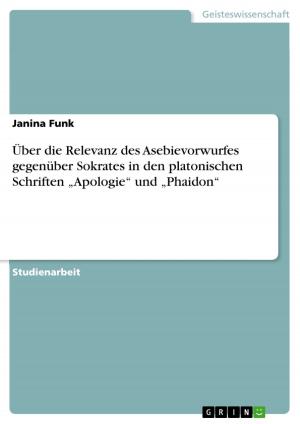The theologico-political foundation of modernity as a political problem
Nonfiction, Social & Cultural Studies, Political Science, Politics, History & Theory| Author: | Andreas Heuer | ISBN: | 9783640929399 |
| Publisher: | GRIN Verlag | Publication: | June 1, 2011 |
| Imprint: | GRIN Verlag | Language: | German |
| Author: | Andreas Heuer |
| ISBN: | 9783640929399 |
| Publisher: | GRIN Verlag |
| Publication: | June 1, 2011 |
| Imprint: | GRIN Verlag |
| Language: | German |
Wissenschaftlicher Aufsatz aus dem Jahr 2011 im Fachbereich Politik - Politische Theorie und Ideengeschichte, Columbia Universität New York, Sprache: Deutsch, Abstract: In this paper I examine two main thinkers who articulated the theologico-political conflict as a major problem of politics and modern state: Leo Strauss and Carl Schmitt. Both were convinced that the liberal state has failed in its attempt to overcome this conflict; they maintain, on the contrary, that faith and religion, albeit in different ways, retain their influence on the public sphere of modern state. The monistic structure of religion, in particular, permeates the western political tradition. This monistic structure which comes from monotheistic religion heavily influenced Greek political philosophy as it was prior to its foundation. Astours notes that 'long before Hellenism imposed itself over the ancient civilization of the East, Semitism had exercised no less an impact upon the young civilization of Greece. Hellenism became the epilogue of Oriental civilizations, but Semitism was the prologue of Greek civilization'. Firstly, I will examine Strauss concept of political philosophy because it brings this conflict into light. Through the distinction between natural law and natural right, Strauss is able to demonstrate how the conflict between politics and religion is at the core of Western political thinking. In following his approach of putting into question the modern concept of natural right, I want to rediscover the basis of the conflict between politics and religion in Western tradition. Secondly, I will question Schmitt's concept of political theology. Schmitt argues that all significant concepts on modern theory of the state are secularized theological concepts. With Schmitt we may better understand the context of ethical-political monotheism in its secularized version a concept that is too often used by the peoples of the developing world to legitimize their political actions towards 'developing countries'. Thirdly, I will present the background of political thinking in East Asia. Here we find a concept of politics which did not develop in the framework of a monotheistic religion. Nonetheless, cosmology plays an important part in its political philosophy, the notion of heaven leads to a more open foundation of a political community where religions are part of such a community without creating a sharp contrast between politics and religion(s).
Wissenschaftlicher Aufsatz aus dem Jahr 2011 im Fachbereich Politik - Politische Theorie und Ideengeschichte, Columbia Universität New York, Sprache: Deutsch, Abstract: In this paper I examine two main thinkers who articulated the theologico-political conflict as a major problem of politics and modern state: Leo Strauss and Carl Schmitt. Both were convinced that the liberal state has failed in its attempt to overcome this conflict; they maintain, on the contrary, that faith and religion, albeit in different ways, retain their influence on the public sphere of modern state. The monistic structure of religion, in particular, permeates the western political tradition. This monistic structure which comes from monotheistic religion heavily influenced Greek political philosophy as it was prior to its foundation. Astours notes that 'long before Hellenism imposed itself over the ancient civilization of the East, Semitism had exercised no less an impact upon the young civilization of Greece. Hellenism became the epilogue of Oriental civilizations, but Semitism was the prologue of Greek civilization'. Firstly, I will examine Strauss concept of political philosophy because it brings this conflict into light. Through the distinction between natural law and natural right, Strauss is able to demonstrate how the conflict between politics and religion is at the core of Western political thinking. In following his approach of putting into question the modern concept of natural right, I want to rediscover the basis of the conflict between politics and religion in Western tradition. Secondly, I will question Schmitt's concept of political theology. Schmitt argues that all significant concepts on modern theory of the state are secularized theological concepts. With Schmitt we may better understand the context of ethical-political monotheism in its secularized version a concept that is too often used by the peoples of the developing world to legitimize their political actions towards 'developing countries'. Thirdly, I will present the background of political thinking in East Asia. Here we find a concept of politics which did not develop in the framework of a monotheistic religion. Nonetheless, cosmology plays an important part in its political philosophy, the notion of heaven leads to a more open foundation of a political community where religions are part of such a community without creating a sharp contrast between politics and religion(s).















